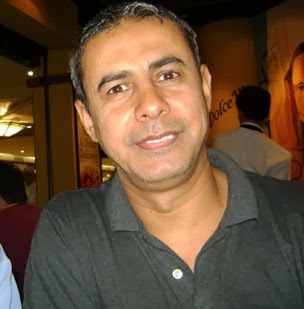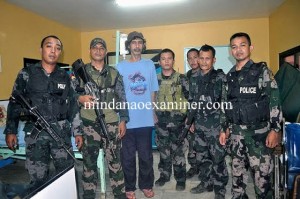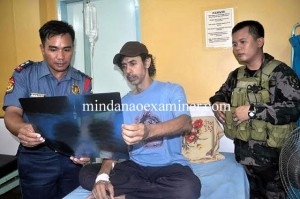
And Atyani with policemen after he is freed by the Abu Sayyaf in these photos released to the Mindanao Examiner regional newspaper by the Sulu Police Office under Senior Superintendent Abraham Orbita.
SULU (Mindanao Examiner / Dec. 4, 2013) – Abu Sayyaf rebels have freed late Wednesday a Jordanian journalist after 18 months in captivity in the jungle of Sulu in the southern Philippines, provincial officials told the regional newspaper Mindanao Examiner.
Officials said Baker Atyani was recovered by police forces in the village of Igasan in Sulu’s Patikul town and has been rushed to the hospital for medical examination.
Baker Atyani, who works for the Arabic television news channel, Al Arabiya, has gone inside camps of the terror group along with his two Filipino assistants – Rolando Letrero and Ramelito Vela, to film leaders of the Abu Sayyaf that authorities have linked to al-Qaeda and Jemaah Islamiya, but had been taken prisoner on June 12, 2012. Atyani’s Filipino assistants had been freed in February this year.
Al-Arabiya has confirmed Atyani’s release. “Concerted efforts that lasted for 18 months led to the release of Al Arabiya correspondent Baker Atyani held in captivity under militant groups in the Sulu Islands in the Philippine province of Mindanao,” Al Arabiya News Channel said.
It said Atyani is “suffering from health problems due to his long period of his captivity.”
Atyani was released after several calls by the Cairo-based al-Azhar, Jerusalem Grand Mufti and the Islamic scholars of Mindanao, the Organization of the Islamic Cooperation, Palestinian President Mahmoud Abbas, and after continuous follow up by the Middle East Broadcasting Center and in close cooperation with his family.
It was unknown if there was or how much ransom was paid for Atyani’s safe release.
Last year, the Philippine military said it would Atyani for espionage. “We will arrest him as soon as he gets out of the Abu Sayyaf – for espionage – and interrogate him about his mission,” Col. Jose Johriel Cenabre, then deputy commander of naval forces in southern Philippines, told the regional newspaper Mindanao Examiner.
He said they were investigating the true intention of Atyani’s clandestine interview with terror leaders. “Atyani is freely moving in the hinterlands with Abu Sayyaf terrorists and we are monitoring the situation,” he said.
Cenabre was removed from his post and transferred to Manila after his statement came out in the press and he later denied making such a report.
Other reports alleged that Atyani was a conduit for the Abu Sayyaf and that the ransom demand was only a cover to hide the flow of funding to the terror group, including Jemaah Islamiya, blamed for the string of attacks and bombings in the Philippines.
Military and police said Atyani arrived in Sulu on June 11 last year and went to the Abu Sayyaf the next day to secretly interview terror leaders and other rebel commanders, including Jemaah Islamiya militants hiding on the island.
The Jordanian journalist had made prior arrangement with the Abu Sayyaf to film a documentary about the terror group. Authorities said Atyani also deceived local officials after he claimed to be filming government projects in Sulu, one of five provinces under the Muslim autonomous region.
Provincial officials had repeatedly warned Atyani against interviewing the Abu Sayyaf, but the trio went ahead and secretly met with terrorist leaders, among them Nadzmie Alih. They were first reported missing after failing to return to their hostel in Jolo town, but phoned local officials two days later to say that they were still filming a documentary on the Abu Sayyaf.
Atyani, who had previously interviewed al-Qaeda terror leader Osama bin Laden in Afghanistan months before the September 11, 2001 attacks on the United States, contacted his colleagues to say that they are being held against their will.
The military’s Western Mindanao Command in Zamboanga City said Atyani had previously filmed in secret the Abu Sayyaf in Sulu province. It said Atyani had been in and out of Sulu in the past and secretly interviewing terrorist leaders.
Just this year, the Bethlehem-based Ma’an News Agency reported that Atyani’s wife, Um Khalid, has appealed to rights organizations and officials to help secure the release of her husband.
Atyani’s own family also appealed to the Palestinian President and King Abdullah of Jordan to help secure the freedom of the journalist. Atyani’s wife and her four children live in Jordan while the journalist’s family is from Anza village in the northern West Bank. (Mindanao Examiner)


